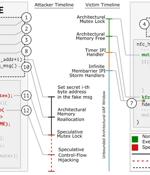Security News

Modern Intel processors, including chips from the Raptor Lake and the Alder Lake generations are susceptible to a new type of a high-precision Branch Target Injection attack dubbed 'Indirector,' which could be used to steal sensitive information from the CPU. Indirector exploits flaws in Indirect Branch Predictor and Branch Target Buffer, two hardware components found in modern Intel CPUs, to manipulate speculative execution for data extraction. The Indirect Branch Predictor is designed to predict the target addresses of indirect branches using historical execution information, while the Branch Target Buffer predicts the target addresses of direct branches using a set-associative cache structure.

Cybersecurity researchers have disclosed details of a now-patched security flaw in Phoenix SecureCore UEFI firmware that affects multiple families of Intel Core desktop and mobile processors....

Researchers have discovered two novel attack methods targeting high-performance Intel CPUs that could be exploited to stage a key recovery attack against the Advanced Encryption Standard (AES)...

Researchers have demonstrated the "First native Spectre v2 exploit" for a new speculative execution side-channel flaw that impacts Linux systems running on many modern Intel processors. Spectre V2 is a new variant of the original Spectre attack discovered by a team of researchers at the VUSec group from VU Amsterdam.

Cybersecurity researchers from ETH Zurich have developed a new variant of the RowHammer DRAM (dynamic random-access memory) attack that, for the first time, successfully works against AMD Zen 2...

Academic researchers developed ZenHammer, the first variant of the Rowhammer DRAM attack that works on CPUs based on recent AMD Zen microarchitecture that map physical addresses on DDR4 and DDR5 memory chips. The ZenHammer attack was developed by researchers at public research university ETH Zurich, who shared their technical paper with BleepingComputer.
A new side-channel attack called "GoFetch" impacts Apple M1, M2, and M3 processors and can be used to steal secret cryptographic keys from data in the CPU's cache. The attack targets constant-time cryptographic implementations using data memory-dependent prefetchers found in modern Apple CPUs.

Oracle warned Apple customers to delay installing the latest macOS 14.4 Sonoma update because it will break Java on ARM-based Macs. According to Garcia-Ribeyro, since the Java Virtual Machine uses dynamic code generation and accesses memory in protected memory regions to ensure correctness and performance, its process will be terminated after deploying the macOS 14.4 update.

A group of researchers has discovered a new data leakage attack impacting modern CPU architectures supporting speculative execution. Dubbed GhostRace (CVE-2024-2193), it is a variation of the...

Vulnerable Docker services are being targeted by a novel campaign in which the threat actors are deploying XMRig cryptocurrency miner as well as the 9Hits Viewer software as part of a...